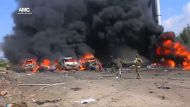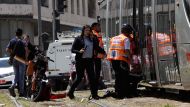Beijing: This wasn't the big one.
There was no need for the US military to shoot down North Korea's anniversary salvo - the missile failed at launch.
More World News Videos
North Korea parades its military might
Kim Jong-un shows off North Korea's submarine-launched ballistic missiles (SLBM) for the first time as the reclusive state marked the 105th birth anniversary of its founding father.
With North Asia on high alert for a feared sixth nuclear test or intercontinental ballistic missile (ICBM) launch this weekend from Kim Jong-un's rogue state, speculation had been rife that the Trump administration would intercept a missile to show that it was prepared to take military action to finally solve the North Korea problem.
Reflecting jitters in the region that rhetorical brinkmanship could spiral into conflict, China warned on Friday there could be no winners in a war.
Some kind of launch by North Korea was highly anticipated as it celebrated the 105th anniversary of the birth of its founder on Saturday. Along with the military parade through the capital Pyongyang, fireworks were expected.
Washington and Beijing had drawn a line in the sand - a flurry of urgent diplomacy in recent days had appeared to be reaching consensus - a new nuclear test or ICBM launch from Pyongyang would trigger severe repercussions. Sanctions, at least.
And there was the not-so-veiled threat from the Trump administration, signalled by its Syrian strike and the dropping of the Mother Of All Bombs on Afghanistan, that there could be a unilateral military response.
The world woke up on Easter Sunday morning to the news that a missile had failed at launch from North Korea's Sinpo naval base at 6.20am local time.

The type of missile is yet to be determined, the South Korean military and US Pacific Command said.
South Korea's government, after an emergency session of its National Security Council, vowed on Sunday to respond "strongly" and warned North Korea would face "serious punitive measures" if it makes another major provocative launch or nuclear test.

Washington's initial response has been to say little. There were no tweets from US President Donald Trump in the hours after the missile launch, though it is known he was in contact with Vice-President Mike Pence aboard Air Force 2.
That's how serious this is - there is no room for rash words.

Pence arrived in Seoul on Sunday afternoon, ahead of a series of meeting with South Korean and Japanese leaders. He is due to meet South Korea's acting President Hwang Kyo-ahn on Monday.
The US won't act without notifying its regional allies.


It was left to US Defence Secretary Jim Mattis to issue a brief statement acknowledging there had been an unsuccessful missile launch.
Whether this attempt by North Korea will unleash repercussions in the United Nations Security Council - far tougher economic sanctions that could cripple Pyongyang - with the support of China is yet to be seen.
Whether Kim follows up with a nuclear test or second missile launch, in the coming hours, or on April 25, the 85th anniversary of the creation of the Korean People's Army, is also yet to be seen.
China's Xinhua state news agency reported on Sunday afternoon that Chinese State Councillor Yang Jiechi and US Secretary of State Rex Tillerson discussed the Korean Peninsula situation via phone on Sunday.
They also discussed the implementation of agreements reached by the two countries' presidents during their first meeting in Florida, Xinhua reported.
Finally breaking his silence, Donald Trump offered this clue of what comes next – on Twitter: "Why would I call China a currency manipulator when they are working with us on the North Korean problem? We will see what happens!"















